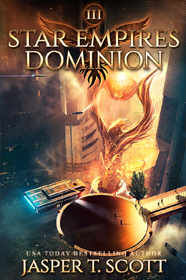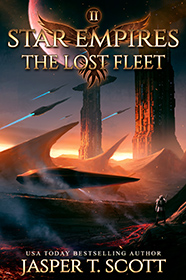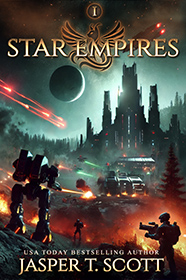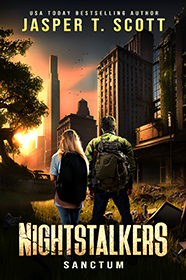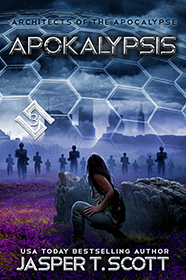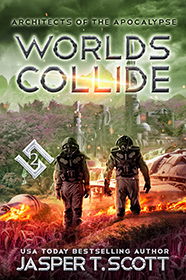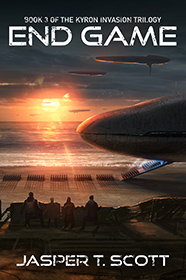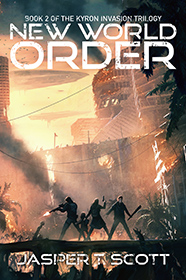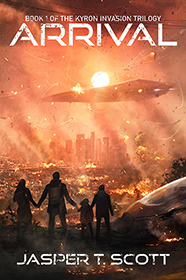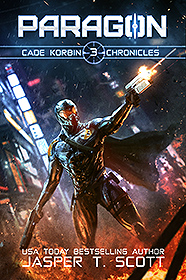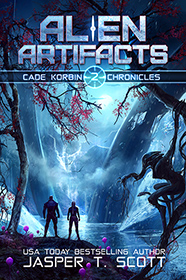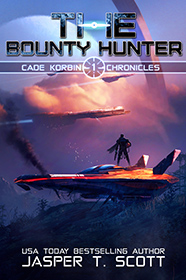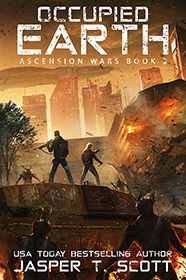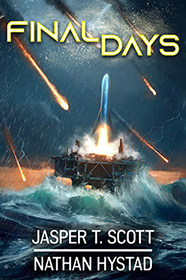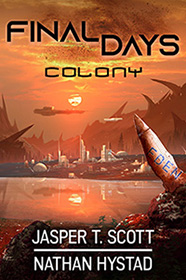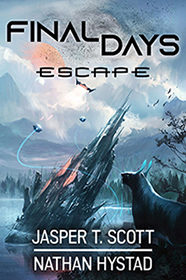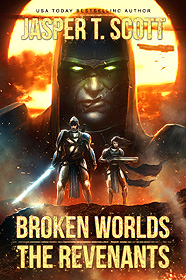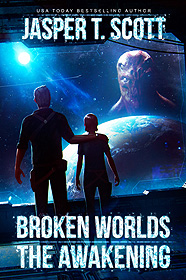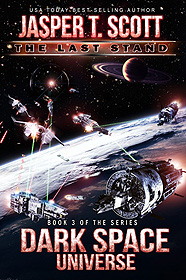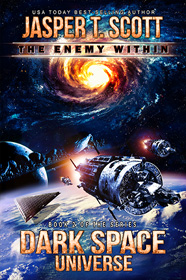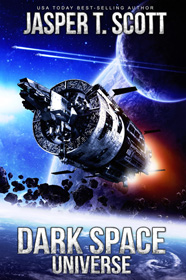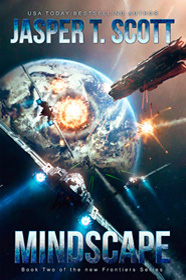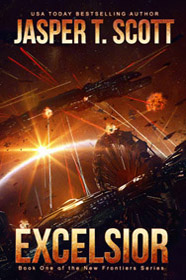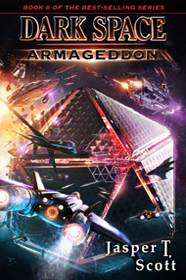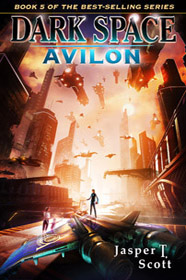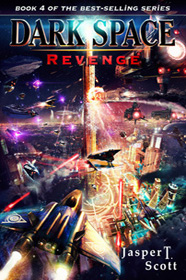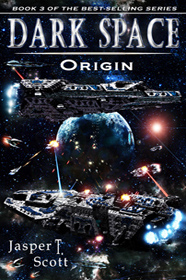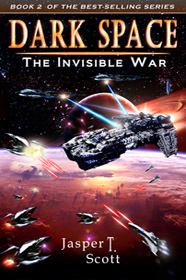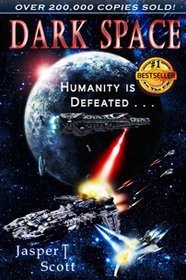As usual, I was optimistic with my plans. Excelsior's release date has been delayed from December 2015 to Early March 2016.
That's now a firm publication date, and pre-orders will be available in January with a $1.00 discount.
As for my progress. The book is 100% outlined and two thirds written, so I'm well on track for an early March release.
All of that disappointing news aside, here's the completed cover for Excelsior!
Wishing You All a Merry Christmas and a Happy New Year,
Jasper
Monday, December 21, 2015
Friday, September 4, 2015
Dark Space (Book 6): Armageddon NOW AVAILABLE!

New to the series? Get Books 1-3 here for a special price: smarturl.it/darkspace1-3amz
On Avilon not Even the Truth will Set You Free . . .
The Real Enemy is Within
Omnius has been hiding a lot from the people of Avilon. The war with the Sythians is not what we thought, but that raises the question: if not the Sythians, then what did Omnius go to fight in the Getties Cluster?
Humanity is Being Held Prisoner
Omnius knows what people will do before they do it. He predicts citizens’ behavior, and some suspect, he even makes those predictions come true. For those who wish to be free of his influence, Avilon’s lowermost city, the crime-ridden, shadow-filled Null Zone is the only option, but it is becoming increasingly apparent that not even the Nulls are free, and there is a more sinister reason behind The Choosing than the one Omnius gave.
As Omnius’s predictions begin to come true, Ethan Ortane realizes he could lose the one thing that matters most to him in the universe--his family.
There is a Rebellion Stirring
Far from Avilon, the Sythians are hiding out in the neighboring Getties Cluster. Out there they discover something that wasn’t supposed to exist: a group of human rebels that escaped from Avilon. Their leader, Therius, seems to raise more questions than he answers, but he has a plan to defeat Omnius that just might work.
And the End is Drawing Near...
As Therius’s plan unfolds, people realize the terrible truth: he can’t win by conventional means, and he knows it. The alternative is called the Armageddon Protocol, but it could mean the end of everything, not just Omnius. . . .
Thursday, August 13, 2015
Dark Space (Book 6): Armageddon Pre-Orders Live
Coming September 4th
On Avilon Not Even the Truth Will Set You Free . . .
The Real Enemy is Within
Omnius has been hiding a lot from the people of Avilon. The war with the Sythians is not what we thought, but that raises the question: if not the Sythians, then what did Omnius go to fight in the Getties Cluster?
Humanity is Being Held Prisoner
Omnius knows what people will do before they do it. He predicts citizens' behavior, and some suspect, he even makes those predictions come true. For those who wish to be free of his influence, Avilon's lowermost city, the crime-ridden, shadow-filled Null Zone is the only option, but it is becoming increasingly apparent that not even the Nulls are free, and there is a more sinister reason behind The Choosing than the one Omnius gave.
As Omnius's predictions begin to come true, Ethan Ortane realizes he could lose the one thing that matters most to him in the universe--his family.
There is a Rebellion Stirring
Far from Avilon, the Sythians are hiding out in the neighboring Getties Cluster. Out there they discover something that wasn't supposed to exist: a group of human rebels that escaped from Avilon. Their leader, Therius, seems to raise more questions than he answers, but he has a plan to defeat Omnius that just might work.
And the End is Drawing Near
As Therius's plan unfolds, people realize the terrible truth: he can't win by conventional means, and he knows it. The alternative is called the Armageddon Protocol, but it could mean the end of everything, not just Omnius. . . .
Tuesday, April 21, 2015
Relativity: Something You Might Not Have Realized
Einstein's theory of relativity means that the faster you go, the slower your time moves with relation to an observer who is not travelling at your velocity. At regular Earth speeds this is such a tiny fraction of a second that it doesn't matter much, but at interstellar speeds approaching the speed of light, the effect becomes noticeable. Most of you already knew something about this, but did you know what that time dilation actually means for space travel? It means that from a space traveler's point of view, objects are actually closer than you might think.
How far is the nearest star?
Proxima Centauri 4.24 light years. Thanks Google.
That's the hard and fast answer, but you might be surprised to know that it's not really hard and fast at all, and I'm not talking about star orbits.
Hop on a fast-moving spaceship and relativity is going to change your mind about how far it is to Proxima Centauri. Mission planners on Earth will say that for an object travelling at 0.5 c (half the speed of light) it will take just over 8 years to reach Proxima Centauri (exactly 8 years to travel 4 light years, assuming no time is spent accelerating or decelerating).
But the pilot of the spacecraft will tell you a different story. While travelling at 0.5c Proxima Centauri will actually be just 3.67 light years away. Travelling at a constant 0.5 c you'll get there in just 7.34 years. A round trip will take 14.68, but on Earth the spaceship will return right on time, 16.96 years later.
What happened? According to the space travelers, Proxima Centauri was more proximal than they thought. According to us on Earth, nothing changed. The distance shrank for the travelers, but not for us. How about that for strange? It's called "length contraction."
It means that distances become infinitely small. Zero in fact. For the light-speed object, not us. What does that mean? Suppose you were a photon. How would you experience time passing?
"If you want to be anthropomorphic about it, a photon doesn't experience the passage of time. To it, it is everywhere at once. (Source: http://www.astro.virginia.edu/~jh8h/Foundations/quest7.html)"
So there's some literal truth to the saying that "God is Light" if you want to point to something in our universe that is omnipresent, at least from its perspective. Of course, light isn't alive, sentient, or a deity, as far as I know, but it's still interesting to think about.
So what if you could move at the speed of light? I suppose you would be everywhere at once, too. Now there's a plane of existence for a real live deity.
Sources: http://www.astro.virginia.edu/~jh8h/Foundations/quest7.html http://www.orionsarm.com/fm_store/RTTCalc.htm http://science.nasa.gov/science-news/science-at-nasa/2006/22mar_telomeres/
How far is the nearest star?
Proxima Centauri 4.24 light years. Thanks Google.
That's the hard and fast answer, but you might be surprised to know that it's not really hard and fast at all, and I'm not talking about star orbits.
Hop on a fast-moving spaceship and relativity is going to change your mind about how far it is to Proxima Centauri. Mission planners on Earth will say that for an object travelling at 0.5 c (half the speed of light) it will take just over 8 years to reach Proxima Centauri (exactly 8 years to travel 4 light years, assuming no time is spent accelerating or decelerating).
But the pilot of the spacecraft will tell you a different story. While travelling at 0.5c Proxima Centauri will actually be just 3.67 light years away. Travelling at a constant 0.5 c you'll get there in just 7.34 years. A round trip will take 14.68, but on Earth the spaceship will return right on time, 16.96 years later.
What happened? According to the space travelers, Proxima Centauri was more proximal than they thought. According to us on Earth, nothing changed. The distance shrank for the travelers, but not for us. How about that for strange? It's called "length contraction."
Question:Now what do you suppose this means for something travelling at the speed of light?
I thought that things shrinking (length contraction) was an optical illusion. But the text says that it is not. If not, then how does something shrink? Answer:
Time dilation and length contraction are not just optical illusions, but neither do they represent a physical contraction. These effects are the result of a measurement from a given inertial frame that is performed on body moving with respect to that frame. We assume that the measurements always take into account the finite travel time of light. Consider two observers moving relative to one another. You have no difficulty with the idea of their velocities being relative - each thinks the other is "really moving." In SR, time intervals and space intervals are also relative. You don't shrink or see your own clock run slow. The other observer sees your clocks slow and meter sticks contracted from his frame. Similarly you will observe his clocks slow and meters sticks short from your frame. The time dilation and length contraction are inherent properties of the way measurements must be performed in spacetime. (Source: http://www.astro.virginia.edu/~jh8h/Foundations/quest7.html)
It means that distances become infinitely small. Zero in fact. For the light-speed object, not us. What does that mean? Suppose you were a photon. How would you experience time passing?
"If you want to be anthropomorphic about it, a photon doesn't experience the passage of time. To it, it is everywhere at once. (Source: http://www.astro.virginia.edu/~jh8h/Foundations/quest7.html)"
So there's some literal truth to the saying that "God is Light" if you want to point to something in our universe that is omnipresent, at least from its perspective. Of course, light isn't alive, sentient, or a deity, as far as I know, but it's still interesting to think about.
So what if you could move at the speed of light? I suppose you would be everywhere at once, too. Now there's a plane of existence for a real live deity.
Sources: http://www.astro.virginia.edu/~jh8h/Foundations/quest7.html http://www.orionsarm.com/fm_store/RTTCalc.htm http://science.nasa.gov/science-news/science-at-nasa/2006/22mar_telomeres/
Monday, February 9, 2015
Dark Space VI: Armageddon Help Me Shape the Plot With Your Input!
Hello everyone! I'm looking for some feedback! I've been tossing ideas around for the conclusion of Dark Space, and I don't want to give anything away, but I've got two--no, three--different directions in mind for the plot at this point. I'm almost done with the outline (the writing usually takes about two months after that), but I still need to decide which spin to put on the plot.
Option One: the humanistic conclusion--we get ourselves out of our own mess through sweat and tears and blood. The ending is messy, and not everyone is going to survive. Bittersweet is the word.
Option Two: we're not alone in the universe. Humanity finds help from a powerful ally that we knew about, but didn't quite believe existed. This direction brings the metaphysical down to a human level where we can see it and feel it, and believe it without saying "That's fantasy not science fiction!" This ally is a force to be reckoned with, but it's so subtle, that if you're not looking carefully you just might miss it! This ending is a happily ever after that will leave you feeling warm and fuzzy inside.
Option Three: the ambiguous blend that just might keep me from stepping on anyone's toes. I do like to walk a fine line with religion, philosophy, and science--for a lot of people I probably cross that line somewhere along the way and make them uncomfortable. This third option means mixing a humanistic conclusion with a metaphysical one. In this case the metaphysical "hints" are just that. It's a connection that's left unexplored, and ultimately unproven in any substantial way. It could be that we had some extra help from some higher power, or maybe we just got lucky. This ending is also messy, and again not everyone is going to survive.
I'd appreciate your help choosing one of these options. I can't promise you'll sway me from the direction I'm currently thinking about, but you never know. And of course, in the interests of not giving any spoilers away, I will NOT tell you which direction I've decided to go with. You'll have to read Armageddon to find out smile emoticon.
Option One: the humanistic conclusion--we get ourselves out of our own mess through sweat and tears and blood. The ending is messy, and not everyone is going to survive. Bittersweet is the word.
Option Two: we're not alone in the universe. Humanity finds help from a powerful ally that we knew about, but didn't quite believe existed. This direction brings the metaphysical down to a human level where we can see it and feel it, and believe it without saying "That's fantasy not science fiction!" This ally is a force to be reckoned with, but it's so subtle, that if you're not looking carefully you just might miss it! This ending is a happily ever after that will leave you feeling warm and fuzzy inside.
Option Three: the ambiguous blend that just might keep me from stepping on anyone's toes. I do like to walk a fine line with religion, philosophy, and science--for a lot of people I probably cross that line somewhere along the way and make them uncomfortable. This third option means mixing a humanistic conclusion with a metaphysical one. In this case the metaphysical "hints" are just that. It's a connection that's left unexplored, and ultimately unproven in any substantial way. It could be that we had some extra help from some higher power, or maybe we just got lucky. This ending is also messy, and again not everyone is going to survive.
I'd appreciate your help choosing one of these options. I can't promise you'll sway me from the direction I'm currently thinking about, but you never know. And of course, in the interests of not giving any spoilers away, I will NOT tell you which direction I've decided to go with. You'll have to read Armageddon to find out smile emoticon.
Subscribe to:
Posts (Atom)

